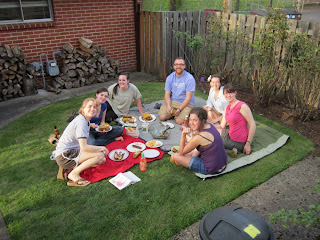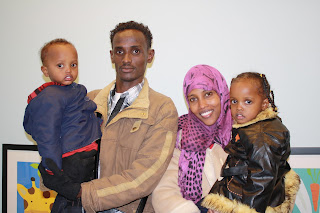I am actually maintaining two blogs about refugee resettlement (which is why both are somewhat neglected). The other one is super politically-correct and is for our organization's volunteers. But I just spent two hours writing a post about food in refugee communities for that blog (so I am really hungry) and I thought it might also interest this crowd. So here is that post from the other blog for your information (in case you are ever invited over to a somali's home for dinner) based on my experiences this year:
"Food is a major part of hospitality for many of our refugee families. For some families, making dinner is a way to say thank you to their volunteer. If a family offers you food or tea, feel free to accept! It can be a new cultural experience and a bonding opportunity for you and the people you are tutoring.
While Bhutanese/Nepali and Iraqi families are likely to feed you early and often, some families are a little more shy about their cuisine. The Burmese families, for example, might not invite you to dinner for some time because they worry you won’t like the food. I volunteered with a Chin Burmese family for 4 months before they invited me to dinner, but after that first dinner they cooked for me every single time I stopped by. Somali families, I have found, will feed you if you happen to be there when they are having dinner. Here is a very basic guide for those times when you are invited to eat with a family—what kind of food and practices you might see in Burmese, Nepali/Bhutanese and Somali households.
Bhutanese/Nepali
[Note: I am using the terms “Bhutanese” and “Nepali” interchangeably in this post. For an explanation, click here]
 |
| A typical Nepali meal |
Bhutanese/Nepali families love to feed people—they consider hospitality to be extremely important. (I cannot tell you how many times case managers have gone to pick up a Bhutanese family for an appointment and have been fed first—it is generally faster to stop arguing about the time and eat). Nepali food is similar to Indian food in that it is very flavorful, is usually eaten with rice, and will not include beef of any sort. A typical Nepali plate might have a big mound of rice surrounded by small bowls of Dahl (lentil broth), spicy chicken or goat and pickled vegetables. In addition, there will usually be a plate of sliced cucumbers or radishes on the table to be eaten intermittently when the food is too spicy. One pours the side dishes onto the rice and then mixes it up and eats it with one’s hands. Nepali/Bhutanese families will usually give you a spoon but they are generally delighted if you try to eat it with your hands “like Nepali” (little kids love giving you lessons about the right way to eat) but make sure you wash your hands first! Also, Nepali people typically do not talk very much while eating a meal.
**Side note from a past volunteer: sometimes Nepali/Bhutanese families serve me food without serving themselves and then watch me eat—this may feel intensely uncomfortable for you, but I would just try to relax and go with it if that happens (though I have tried to explain to families that I prefer eating with them, with mixed success).
Nepali/Bhutanese families will keep putting food on your plate until you tell them to stop—they want to make sure you eat as much as you want. You might have to tell them several times that you are full before they will stop trying to give you more—so if they just put more food on your plate, don’t worry if you cannot finish it. When you are finished, it is perfectly okay to lick your fingers (but don’t do that while you eat, that’s frowned-upon) and then you can go wash your hands at the kitchen sink.
Before or after dinner (or really anytime during the day) Nepali families will serve tea (aka “chai”). Their tea is steeped in milk with cardamom seeds and is very sweet (if you are diabetic, mention it before they make the tea—this tea is usually loaded with sugar). Everybody in the family drinks tea, down to the littlest kids who might drink out of carefully-cooled bowls.
Burmese
Burmese food varies among the different ethnic groups but it is generally similar to Chinese food (e.g. a lot of rice, noodles and fish sauce). Consequently, Burmese families do most of their shopping at Asian markets like Fubonn on SE 82nd Ave. Burmese food tends to be served with a main dish of rice, noodles, or soup and lots of little bowls of other ingredients on the tables from which you mix your own dish (which is nice if you want to avoid spicy food). Karen families will more often eat with their hands while other ethnic groups prefer to use spoons.
 |
| A typical Burmese meal |
Generally it is polite to finish your food but they won’t be insulted if you cannot. Much like with the Nepali they will keep serving you seconds and thirds in order to be hospitable so it is important to tell them when you don’t want any more. Also, it is fine to ask what is in a dish ahead of time and refuse it if you don’t like some of the ingredients—just tell them you don’t eat ___, they won’t mind. It will be a lot more awkward after the fact if they find out they have been serving you something you don’t like.
If you want to cook for a Burmese family, chicken is probably your safest bet. Mostly stay away from cheese and dairy, the Burmese tend to be unfamiliar with cheese in particular and don’t like to eat it. Baked goods and sweets are popular, though Burmese families don’t typically know how to bake these themselves (ovens are a new experience for most of the families).
Finally, if you are going to have tea with a Burmese family, expect Jasmine tea without sugar—it is a light, sweet-smelling green tea that one can buy fresh from Asian markets.
Somali
Somali food is characterized by lots of meat (beef or camel) cooked in oil and onions and eaten with bread. Somali families observe halal (Islamic rules for eating) pretty strictly so they buy most of their meat at Halal markets around Portland. Somali food is also strongly influenced by past Italian colonialism so most Somalis love spaghetti with onions and tomatoes any time of the day. Bananas are also a major part of meals for many Somalis—they will serve rice or pasta with a whole raw banana on the side.
 |
| Somali Sambusas |
I have also found that since many Somalis spent a long time in refugee camps they frequently eat the food of whatever country they lived in before coming to America—so there can be a lot of variation in what families will eat (e.g. if a family came from Kakuma, Kenya they will eat a lot of Kenyan food). One dish that is pretty popular with most east Africans is Sambusas (aka “samosas)—fried dough packets stuffed with spicy ground beef or lamb (I highly recommend them!).
As with Nepali/Bhutanese families, Somalis will probably give you a spoon but they will be delighted to teach you to eat with your hands. If you are unsure how to eat something, just ask them how they would do it (though they will probably first insist that you can eat it however you would like).
If you are cooking for a Somali family, chicken is probably safest bet (they are not as concerned about what store it came from) but raw veggies (e.g., salads) will probably not go over very well. Never serve something prepared with alcohol—even if it is “cooked off” (e.g. in desserts).
You will probably be served Somali tea starting with your very first visit. They prefer black tea steeped in milk with cardamom pods, cinnamon sticks and whole cloves (basically a chai latte—very delicious!). They tend to drink it very sweet with lots of sugar so be sure to tell your host in advance if you cannot eat that much sugar.
Again, these are very basic guidelines, every family is different. We would love to hear some stories from our volunteers about eating with refugee families, feel free to post a comment below!"
So there you have it. FYI I am trying to get an "in" with each community so that I can learn how to cook all of this food so that I do not experience painful withdrawals when I return to Salt Lake City in a month.














